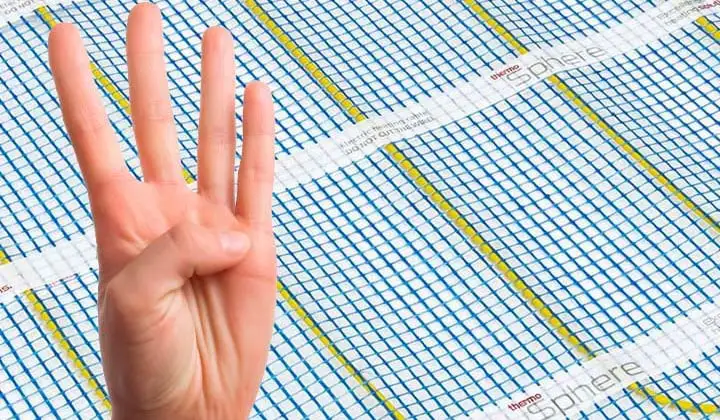7 min read
4 Things that can affect electric underfloor heating output
If you are looking into buying and installing electric underfloor heating in your home, it’s vital that you understand and get the right heat output....

When you think of underfloor heating, the first thing that most likely comes to mind is heating a tiled floor in a bathroom or wet room. However, underfloor heating can be used all around the home, in any room, even under carpet!
Under carpet?
Yes. Even under carpet.
Like all other floor finishes, there are some key things you need to know before installing underfloor heating under carpeted floors. Don’t worry. We’ll walk you through everything you need to know and include some recommendations on the best type of underfloor heating system to use.
If you want to skip this article and just talk to us, get in touch via our contact page and one of our team will be on hand to answer any questions you may have about underfloor heating under carpets.
Just like the benefits of heating a tiled floor, the benefits of heating carpets are not much different. Both hydronic (wet) underfloor heating and electric underfloor heating produce radiant heat which rises evenly upwards. This is different to how radiators heat a room, as they heat the air which circulates around the room as a result of convection. The warm air rises, cools and then any dust particles fall to the carpeted floor.
Now then, because carpets tend to absorb dust particles, the more dust particles falling to the floor means spending more time to vacuum them up. Underfloor heating doesn’t cause air circulation and therefore reduces dust being circulated in the room. That’s great for carpets and less time spent vacuuming.
We’ve covered much more detail about underfloor heating benefits in other articles on our heating blog.
There are so many types of carpet available to buy. In the UK in particular, there are two main types of carpet: tufted and woven. Tufted carpets are the most popular and come in a variety of materials and styles. They also have a wide price range. You can pick up a basic synthetic tufted carpet just for a few pounds per square metre.
You can expect to pay around £55m2 – £65m2 for a more traditional woven carpet. Woven carpets tend to be longer-lasting and a higher quality. They are manufactured using methods that first appeared back in the 16th century and normally used within high traffic areas of a home such as hallways.
Before going ‘all in’ with selecting your carpet to lay over the underfloor heating, there are some points to consider.
Tog Rating: The majority of carpets have a tog rating value of between 1.5 and 2. The absolute maximum tog rating to use is 2.5 because anything more will cause the underfloor heating system to not work as it should. This is because the carpet will trap air in itself, which acts as an insulator. We always recommend that you triple check with the manufacturer if the carpet you are thinking about buying is suitable for underfloor heating.
Thermal Resistance: Care and attention needs to be given to the layers above the underfloor heating. Over insulating the layers above will result in the heat generated from the heating system to not effectively penetrate through the layers. Any carpet underlay used should have a low thermal resistance and the carpet ideally should be hessian-backed rather than felt-backed because it’s much more ‘underfloor heating friendly’.
Floor Temperature: The recommended maximum temperature to run the underfloor heating system under a carpet is 27 degrees Celsius. You can set this via your underfloor heating thermostat. It is a good idea to get a heat loss calculation to help determine the right heat output for the room.
Insulation Board: This point applies to any type of electric underfloor heating system. Where possible, we always recommend insulation board in any underfloor heating build up. Without it, your system will take longer to heat the space because some of the heat is lost through the substrate which costs you more money. You can improve the efficiency of your electric underfloor heating system by up to 50%, just by installing 6mm or 10mm insulation boards.

The go to electric underfloor heating system for carpets is a foil-based system. Foil systems are perfect for floating floor finishes such as wood, carpet and vinyl. Two layers of foil wrap the heating cable which provides a fast heat up time and optimum thermal conductivity. These types of system include; The Combymat system from Heat Mat. Warmup’s Foil Heater and our own ThermoSphere Foil.
All of these systems may look very similar but there are lots of subtle differences which make the efficiency and practicality of different systems better than others. For example, exposed cable loops help speed up installation time and some aren’t fully earthed straight out of the box.
So, your electric underfloor heating is installed and your beautiful new carpet has been fitted. How do you keep the system working to its maximum efficiency as well as keeping your carpet intact?
Rugs and beanbags!
Actually, there’s more to it than simply not covering your carpeted floor with a rug or a beanbag. Any flat-bottomed furniture or anything with a tog rating of 2.5 and above should not be placed over a heated floor. More specifically any area where heating cable is installed. If you do, you will restrict the airflow to the floor and in turn cause ‘thermal blocking’. This can result in the heating cable overheating causing damage to carpeted floor above.
Overheating
‘Control is King’ with underfloor heating. Matching a thermostat to your lifestyle will not only help you to be more energy efficient, it will make sure that maximum temperature limits are not exceeded therefore reducing the risk of damage to the floor covering.
We usually recommend running electric underfloor heating between 25 degrees Celsius and 27 degrees Celsius. for the time that you want to be warm. When you want your heating to be effectively off use a set back temperature of between 16 degrees Celsius or 18 degrees Celsius. This can all be set up using a programmable thermostat.
We hope this blog post has given you some helpful pointers to the right direction for using electric underfloor heating with carpet finished floors. Our team are on hand to help answer any further questions that you may have. Head on over to the contact us page to start the conversation.

7 min read
If you are looking into buying and installing electric underfloor heating in your home, it’s vital that you understand and get the right heat output....

6 min read
In the latest Home Improvement Trends Report 2022 by Rated People, the perceived value that underfloor heating adds to a home is a whopping £12,290....

11 min read
As a British manufacturer of electric underfloor heating, we often get asked ‘What’s the best electric underfloor heating system to use?’. Sounds...